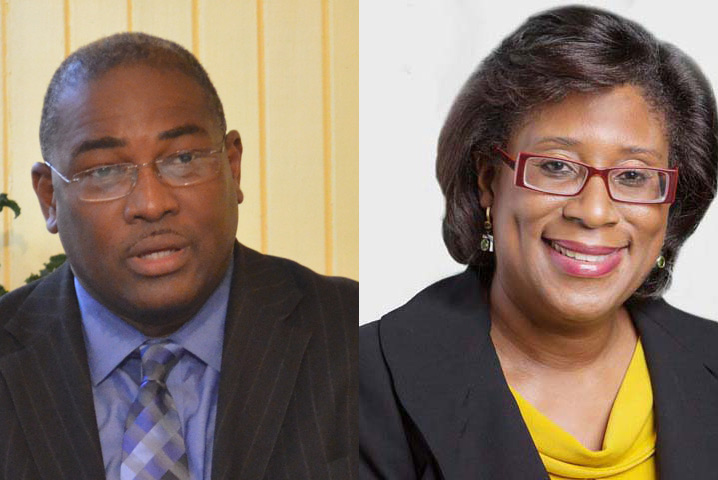Anti-corruption watchdog, the Transparency Institute of Guyana Inc (TIGI) says ministers of government should give more than oral assurances to issues of conflict of interest and the Integrity Commission should lead the way in having sound policies to address the issue.
“We are asking, on behalf of the people, what system is in place to avoid conflicts that can emerge, and we are concurrently asserting that the solution needs to be something that we can rely on going forward,” head of TIGI, Dr Troy Thomas said yesterday in response to questions by Stabroek News.
TIGI has been in the forefront of calling for the establishment of a Code of Conduct for ministers of government and public officials. Their most recent call comes against the backdrop of the Hughes, Fields & Stoby law firm establishing an office in Houston, Texas to attract oil industry clients. Principal of the firm, attorney Nigel Hughes, is the husband of Minister of Public Telecommunica-tions Cathy Hughes.

“Just the fact that Nigel Hughes is the husband of Minister Cathy Hughes means that there is a potential conflict of interest. I hasten to reiterate that I am not, neither is TIGI, attempting to attack or make accusations against anyone,” Thomas said.
“A new code of conduct for public officers have been implemented…the code speaks of conflicts of interest. I would like to know whether any declaration about the new business venture was made to the Integrity Commission, which, I believe, should handle matters involving ministers of government. If such a declaration was made, what steps were prescribed for the minister to take, and perhaps the firms as well to guarantee that no conflict of interest will be acted upon? What continuing efforts do the minister and the firm have to make to keep conflict of interest at bay in the future,” he questioned.
“TIGI is not satisfied that conflict of interest is ruled out or adequately dealt with,” he added.
‘Major conflict of interest’
Thomas reiterated that neither he nor TIGI was, in any way, attempting to attack or make accusations against anyone but emphasised that they believe that Guyana’s citizenry needs more than word-of-mouth assurances from its politicians.
“We don’t want to take away any legitimate economic engagements from anyone, we expect them to be smart in business and when they do well, the country also benefits. But the problem here is that there is a major conflict of interest in Mr Hughes playing an integral role in linking people who might get into the oil industry in Guyana, given that his wife is a current minister of government,” Thomas said.
“We want to know that there is insulation of the government, or the business is insulated from her and will not draw on any privileged information that she may obtain due to her position. People in these positions try to impress upon us that they won’t act on these privileges and we are asked to trust their integrity. And while I am saying there is nothing I can point to that warns unequivocally against trusting them, we need more than individual proclamations of individuals. If we accept this, then (we) have to be willing to accept and rely (on) such verbal assurances from everyone else. This is not the way we want to do state business going forward,” he emphasised.
Late last month, Hughes, Fields & Stoby announced that it was opening an office in Houston, Texas, USA, to guide prospective oil sector investors on doing business in Guyana.
“Hughes, Fields & Stoby, in partnership with Access Point, becomes the first legal and business protocol firm locally to establish a Houston, Texas presence in recognition of the emerging importance between the American energy capital and Guyana, as an emerging energy powerhouse,” the firm said in a statement.
The firm identified Greg Clark, who worked with Occidental Petroleum Company as that organisation’s Legal Manager, as the person who would lead the Hughes, Fields & Stoby team in Houston. It was also stated that the preparation for the development began a year ago with the collaboration between Hughes, Fields & Stoby, and the global law firm of Shearman and Sterling.
During the launch, which was held at the Marriott Hotel and which Minister Hughes attended and was singled out, Clark said the firm will be monitoring all legislation and regulations that might impact on oil industry companies that are currently operating here or plan to do so.
“I like to call it ‘legislative watchman’, that the firm will keep their eyes out for every law, rule, regulation or policy that could impact our clients and we’ll take it upon ourselves to give them a draft of that document, if it’s available, along with a memorandum summarising the potential impact that new legislation can have on the company, for those companies that want that service,” he said.
“…This is a totally different environment here. The laws don’t exist and they are in the process of being developed and so I would imagine that this new service of being a watchman of the stuff that is coming, ought to be of an interest to our clients but it’s their call,” he added.
Shoes on the other feet
Thomas said since the launch of the firm, the public is not aware of Minister Hughes’ role or if she has declared insulation or documented commitments to a non-conflicting stance.
“The position as a minister of government is an importan and serious one and sometimes people have to make hard choices. If you want to serve in both roles, you have to ensure that you don’t abuse the power entrusted to you. Now, so far, I have not seen anything, any document or legal commitment on which we can rely as assurance against acting on the conflict of interest. As a country, we have to stop accepting this, and ministers of government must reflect on how they would feel had the shoes been on the feet of their political opponents,” Thomas asserted.
“The public at large must also understand that while we may, in one instance, feel confident in an individual, if we accept that individual’s word, we have to be willing to allow the same standard of assurance for everyone else regardless of who it is. As soon as you realise that you are unwilling to do that, it also means that you cannot allow it for even those that you might support politically,” he added.
The revised Code of Conduct, incorporated into the Integrity Commission Act last year, states that public officials “shall be accountable to the public for his or her decisions and actions and shall submit himself or herself to scrutiny and criticism…” It also states that those officials shall, in the execution of his or her official functions, conduct himself or herself in a manner that is worthy of the respect of his or her peers and the public.
The Code’s main purpose is to assist Ministers, Members of Parliament and other public office holders in discharging their obligations to their constituents and the public at large; and provide guidance on the values that should govern the conduct of these officials in all aspects of their public life.
Among other things, it says that the officials have a moral responsibility to preserve the reputation of his or her office. It says that the officials should “declare any private interest relating to the discharge of his or her duties and responsibilities and ensure that his or her personal decisions and actions are not in conflict with the national interest.”
It says too that officials “shall have a basic responsibility to take decisions only in the national interest void of any forms of personal gain, or other material benefits for themselves, their family or their friends.” It adds that the officials shall be open about all his or her public decisions and actions and be prepared to provide explanations when so demanded by the public.






